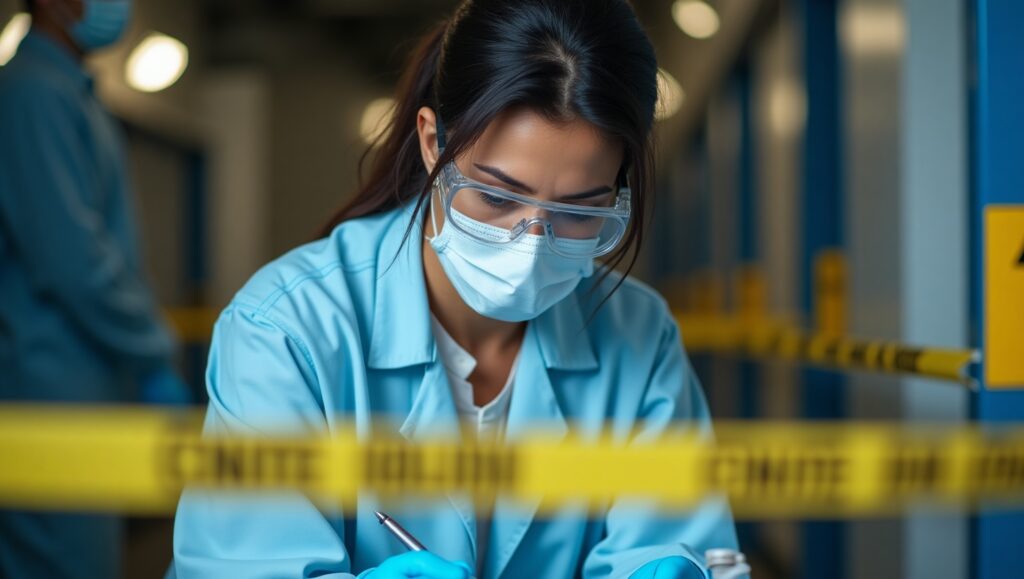IN FORENSIC ACCIDENTOLOGY "LEGAL ACCIDENTOLOGY"
The Hotbed in Forensic Accidentology called «LEGAL ACCIDENTOLOGY» It emerged as a space for study and analysis dedicated to the scientific investigation of accidents and their impact on the forensic field. In a context where traffic, work-related, and domestic accidents represent a constant concern for public safety and justice, this center is established as a place to deepen our understanding of the causes and consequences of these events.
It is comprised of students interested in forensic science and road safety, and its purpose is to contribute to the development of specialized knowledge in the field of accident research, train future experts in the collection and analysis of evidence at the scene of an accident, and promote rigorous and ethical investigative practices in the study of accidents.

IN FORENSIC ACCIDENTOLOGY "LEGAL ACCIDENTOLOGY"
Accident Investigation and Analysis: The hotbed aims to investigate and analyze different types of accidents, such as traffic, work and domestic accidents, in order to identify their causes, characteristics and consequences. Through the study of practical cases and the application of forensic methodologies, participants will develop skills for the reconstruction and analysis of accidental events.
Training in Evidence Collection Techniques: The objective is to provide theoretical and practical training in evidence collection techniques at the accident scene. Participants will learn to identify and preserve relevant evidence, using appropriate forensic tools and protocols to ensure the integrity of the accident scene and the validity of the investigative results.
Application of Forensic Methods in Accident Investigation: The hotbed will promote the use of forensic methods and techniques in accident investigation, such as impact analysis, event reconstruction and injury evaluation. Participants will acquire knowledge about the tools and procedures used in accident investigation, thus contributing to the clarification of cases and the prevention of future events.
IN FORENSIC ACCIDENTOLOGY "LEGAL ACCIDENTOLOGY"

The Hotbed in Forensic Accidentology «LEGAL ACCIDENTOLOGY» It is based on solid conceptual and theoretical foundations in the field of forensic science and road safety, which include:
1. Principles of Accident Investigation:
The study of the fundamental principles of accident investigation is addressed, including the identification of contributing factors, the reconstruction of events and the determination of legal responsibilities. Emphasis is placed on the importance of following international protocols and standards to guarantee the objectivity and accuracy of the results.
2. Technology Applied to Accidentology:
The use of advanced technology in accident investigation, such as geographic information systems (GIS), 3D laser scanners, and computer simulations, is discussed. The advantages and limitations of each technological tool are highlighted, as well as their application in the reconstruction of events and the preparation of expert reports.
3. Legal and Ethical Aspects in Forensic Investigation:
- It reflects on the legal and ethical aspects surrounding forensic accident investigation, including the protection of privacy and rights of victims, impartiality in the analysis of evidence, and the objective presentation of results before judicial bodies. Emphasis is placed on the importance of maintaining high ethical standards in professional practice.
THAT ARE IN EXECUTION
PROJECT TITLE | TEACHER MENTOR | CAMPUS |
Traffic Accident Reconstruction | Dayán Ruiz | Panama |
Legal and Ethical Aspects in Forensic Investigation Related to Traffic Accidents | Dayán Ruiz | Panama |
Biosecurity in traffic scene management: Evaluation of protocols and challenges in forensic practice. | Sindy Masiel Ortiz Torres | David |
MENTOR TEACHERS OF THE SEEDBED:

BASE BIBLIOGRAPHY
- Fernández, MC, & García, L. (2020). "Study of the relationship between speed and severity of injuries in traffic accidents: forensic and road safety implications." Traffic Injury Prevention, 19(3), 88-101.
- García, FJ, & Hernández, A. (2020). «Assessment of visibility at the accident scene: forensic analysis and practical considerations». Journal of Forensic Investigation, 8(2), 102-115.
- Gómez, PA, & Fernández, S. (2021). "Methods for virtual reconstruction of traffic accidents: advances and applications in forensic practice." Forensic Engineering, 12(1), 45-58.
- Jiménez, AM, & García, R. (2020). "Analysis of traffic accidents: forensic methodologies and practical application." Journal of Forensic Research, 15(2), 78-92.
- López, AB, & González, C. (2021). "Traumatic injuries in traffic accidents: forensic analysis of injury patterns and mechanisms." Journal of Forensic Medicine, 7(2), 60-73.
- Martínez, EJ, & López, J. (2019). "Analysis of the influence of alcohol on the occurrence and severity of occupational accidents: forensic and public health perspective." Journal of Occupational Health, 67(1), 42-55.
- Martínez, ER, & López, M. (2018). "Forensic reconstruction of domestic accidents: case study and injury analysis." Forensic Science International, 285, 134-148.
- Pérez, LM, & Rodríguez, J. (2019). "Impact of human factors on the occurrence of occupational accidents: a forensic approach." Journal of Forensic Sciences, 65(3), 211-225.
- Rodríguez, MA, & Pérez, S. (2018). «Photographic documentation techniques in the reconstruction of traffic accidents: application in forensic practice». Forensic Photography Journal, 5(1), 30-43.
- Sánchez, JR, & Martínez, L. (2019). "Impact of road condition on the severity of traffic accidents: a forensic study." Accident Analysis & Prevention, 142, 210-225.

